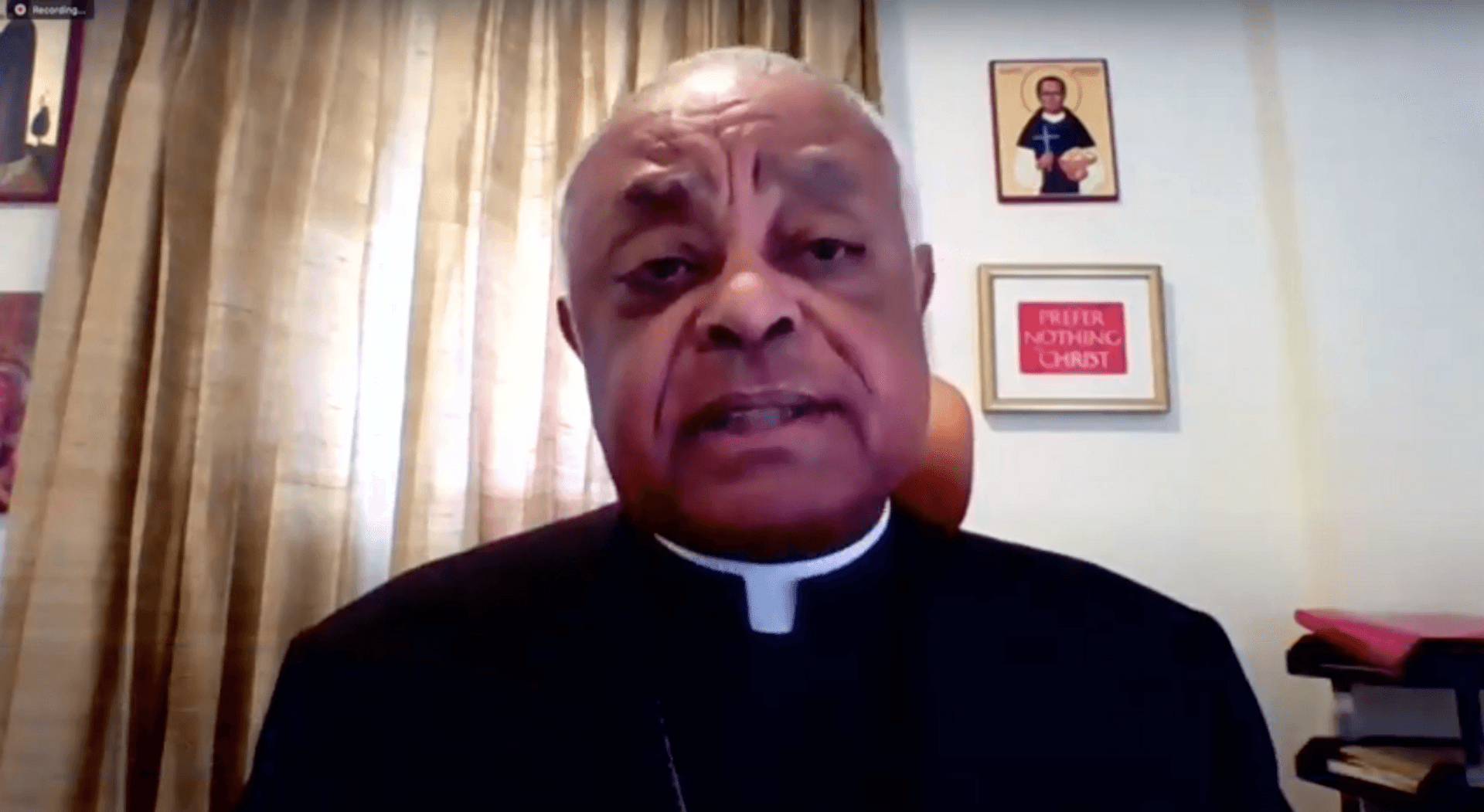NEW YORK — Archbishop Wilton Gregory of Washington doubled down on his criticism of President Donald Trump’s visit to the Saint John Paul II National Shrine earlier this week, saying Friday that a place dedicated to the memory of the late Polish pope should have “never been used as a place for a political statement.”
“Long before he became Supreme Pontiff, he was battling systems that were intended to destroy, weaken, or certainly, deny human dignity,” Gregory said of Pope John Paul II.
“That shrine is a holy place because of the man that it honors,” he said, repeating his denunciation from Wednesday of the President’s visit one day after police used tear gas to clear out Black Lives Matter protesters in downtown Washington in order for Trump to visit St. John’s Episcopal Church for a photo-op holding up the Bible.
RELATED: D.C. archbishop blasts Trump’s visit to John Paul II Shrine
The D.C. archbishop’s remarks came on Friday during an online conversation on “Racism in Our Streets and Structures: A Test of Faith, A Crisis for Our Nation,” sponsored by Georgetown University’s Initiative for Catholic Social Thought and Public Life, organized in light of the ongoing national protests over the continued killings of unarmed black individuals by the police in recent weeks.
The discussion garnered more participation than any event in the seven-year history of the Initiative with more than 7,900 viewers, a fact that director and conversation moderator John Carr said he believes is a sign of the interest and desire among Catholics for racial justice.
Gregory, who opened the event with a prayer that included thanks for those who “take to the streets to protest injustice,” said the criticism that he’s received in recent days by those who sought to portray his remarks as partisan reminded him of the same criticisms of priests and nuns who marched during the Civil Rights era.
“The Church lives in society,” he told attendees, adding that it does not live behind the four walls of the physical church.
While participants in the hour-long conversation praised the actions of those taking to the streets in peaceful protest and demanding systemic change, many echoed EWTN radio host Gloria Purvis in suggesting Catholics need an examination of conscience as to how they might have explicitly or implicitly contributed to racial injustice.
Ralph McCloud, director of the Catholic Campaign for Human Development, the U.S. bishops’ anti-poverty program, told participants that going forward, the U.S. bishops “can be more proximate to the pain” of those marginalized.
“We know the principles, but we haven’t been able to accompany,” he said.
Marcia Chatelain, distinguished associate professor of history and African-American studies at Georgetown University, offered a searing indictment of White American Catholics, many of whom she said aren’t ready to have a conversation about “what are we willing to pay and what are we willing to give back” in order to begin to achieve justice.
“What is happening to America isn’t simply about racism, because racism needs other counterparts in order to grow and feed itself,” said Chatelain. “This is also a referendum on capitalism…it’s about the economic inequality and the fact that we’ve allowed a certain segment of the population to brutalize others without any accountability.”
“This is about a series of interconnected systems,” she warned, that perpetuate and aid injustice to people of color.
Both Purvis and Chatelain made references to the pro-life movement, criticizing those who fail to see the Black Lives Matter cause as consistent with their own.
Purvis appealed to pro-life advocates, saying the viral eight-minute video of a police officer resting his knee on George Flyod’s back as he slowly lost consciousness and died should be like watching an abortion being performed and experiencing the pain of not being able to do something in response.
Similarly, Chatelain singled out those who show up for the March for Life and are puzzled as to why people are currently protesting in Washington against police brutality.
Looking ahead, Gregory warned against Catholics having “too close an alignment with any political party,” saying that it “weakens our prophetic capacity” and that the Church loses “the capacity to speak the gospel truth to everyone” when it is perceived as being in the pocket of a particular party or candidate.
He went on to call for both personal and systemic changes, saying that he believes “this is more than just a passing moment,” and that he’s heartened when he sees so many white protesters joining their black sisters and brothers in demanding change.
Chatelain said the promise in the present unrest is that the nation is having a “very serious conversation about policing,” including the possibility of defunding and dismantling the police force in its current structure.
“What would it mean for the Church to say that we no longer want to have Catholics to provide the funding for this type of state violence?” she asked.
At the end of the call, both the attendees and organizers were greeted with the surprise addition of Vatican Cardinal Peter Turkson, prefect of the Dicastery for Promoting Integral Human Development, who called in to express the need for solidarity, saying the “brotherhood among humanity needs to be restored, accepting one another is God’s plan for all of us.”
Both Purvis and McCloud cited the fact that so many people were taking to the street right now in the face of death and danger stemming from the COVID-19 pandemic, yet were willing to risk their health for the cause of justice, is one hopeful sign of solidarity which keeps them optimistic that things can change and must change.
“I would hate to live in a country when we all saw what happened to George Floyd and nothing happened,” McCloud said.
Follow Christopher White on Twitter: @cwwhite212















